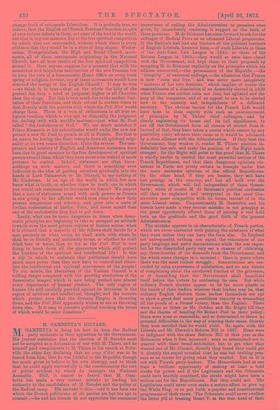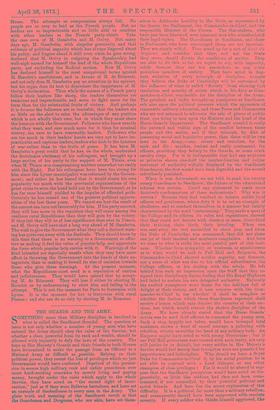M. GAMBETTA'S MISTAKE.
M GAMBETTA is doing his best to keep the Radical ss party moderate in their opposition to the Government. His journal maintains that the election of M. Barodet must not be accepted as a declaration of war with M. Thiers, and he himself paid compliments to M. Thiers in his speech at Belle- ville the other day, declaring that no coup d'e'tat was to be feared from, him; that he was faithful to the Republic, though too much given to believe in his own strategy, and to think that he could apply successfully to the constituencies the sort of politic artifices by which he manages the National Assembly. Still, it cannot be denied that M. Gam- betta has made a very serious mistake in lending his authority to the candidature of M. Barodet and the policy of the Radical camp. His mistake is this,—and it has been one which the French politicians of all parties are but too apt to commit ;—he and his friends do not appreciate the enormous M GAMBETTA is doing his best to keep the Radical ss party moderate in their opposition to the Government. His journal maintains that the election of M. Barodet must not be accepted as a declaration of war with M. Thiers, and he himself paid compliments to M. Thiers in his speech at Belle- ville the other day, declaring that no coup d'e'tat was to be feared from, him; that he was faithful to the Republic, though too much given to believe in his own strategy, and to think that he could apply successfully to the constituencies the sort of politic artifices by which he manages the National Assembly. Still, it cannot be denied that M. Gam- betta has made a very serious mistake in lending his authority to the candidature of M. Barodet and the policy of the Radical camp. His mistake is this,—and it has been one which the French politicians of all parties are but too apt to commit ;—he and his friends do not appreciate the enormous importance of nailing the Administration, to promises once given, by immediately rendering it support on the faith. of those promises. M. cle Remusat has come forward to ask for the suffrages of Radic.a,1 Paris on an advanced Liberal programme. If the Radicals had had any tincture of the political instincts of English Liberals, however keen,—of such Liberals as those of the Anti-Corn. Law League in 1845, or those of the Reform League in 1860,—they would at once have closed with the Government, and kept them to their proposers by accepting M. de IMmusat explicitly on the principles whieh his address announced,—the permanence of the Republic,—the " integrity " of universal suffrage,—the admission that Fiance is now "calm, and free," and, was never more completely "mistress of her own destinies," which implies of course the reasonableness of a dissolution of an- Assembly elected in 1870 when France was neither calm nor free, but agitated and the prey of the conqueror, and of an appeal to one to be elected now in the serenity and independence of -a. delivered territory. The obvious tactics for the French Left Would have been to close eagerly with such. an announcement of principles by M. Thiers' chief colleague, and' by clearly registering its terms and its full significance, to cut off the Government from all °hence of retreat from ilt Instead of that, they have taken a course which cannot by any possibility really advance their cause as it would be advanced by a close alliance with the Administration. If they beat the Government, they weaken it, render M. Thiers' position in- definitely less- safe, and make the position of the Right much stronger ; for the Right will point to the proof that IL.Thiess is wholly unable to control the most powerful section of the • French Republicans, and that their dangerous- opinions, vic- torious in Paris., are pretty certain to trample. unfivr foot the more moderate opinions of the official Republicans. On the other hand, if they are beaten, they will have lost prestige in the country, and lost all hold over the Government, which will feel independent of them thence- forth ; while of course M. de Rennisat's political confession will then be explained and interpreted in the most Con- servative sense compatible with its terms, instead of in the most Liberal sense. Unquestionably X Gambetta and his friends have made a very serious mistake in not grasping at the great' opportunity offered them of gaining a real hold both on the gratitude and the good faith of the present
Administration. •
The mistake appears to us. characteristic of French parties, which are never contented with gaining the substance of what they want unless they can have the form also. rn England not unfrequently, nothing can. equal the vehemence of our party language and. party denunciations while the war rages.; but let the dissatisfied party only see a chance of obtaining, say, three-fourths of its- demand% from the Government, and the whole scene changes in. a moment.; there is peace where there was-the most violent struggle; denunciations are suc- ceeded bicalm expressions of satisfaction, and no one thinks of complaining about the unrelieved fraction of the grievance, or of demanding that the Government shall humiliate itself before the' victors confessing its- sins. But while ordinary French electors appear to be far more plastic in the hands of their leaders, whoever their leaders may be, than ordinary English electore, those- leaders themselves are apt to show a great deal more punctilious tenacity in demanding all the proofs of a formal victory, than the English. There were none so bitter as, Mr. Cobden and Mr. Bright tilt. they saw the chance of bending Sir Robert Peel to their policy ; there were none so reasonable, and so determined to throw no personal difficulties-in the way of winning their cause directly they were satisfied that he would yield. So, again, with the Liberals and Mr. Disraeli's Reform Bill in 18•67. None were so indignant with the sham Reform Bill of that year as the Reformers when it first appeared ; none so determined not to quarrel with their bread-and-butter, but to get what they wanted out of Mr. Disraeli, directly they found they could- get it, 'directly the sequel revealed that he was but inviting pres- sure as an excuse for giving what they wanted. But so it is not with French party-leaders. The Monarchists had at one time a brilliant opportunity of making at least a bold stroke for power, and if the Legitimists and the Orleanists could have heartily combined, the stroke might have been a serious one for the Republicans. But they could not. The Legitimists could never even make a serious effort to give up the White Flag, or to put forth a popular and constitutional programme of their views. The Orleanists could never swallow the bitter pill of treating- Henri V. as the true head. of their House. The attempts at compromises always fail. No people are so easy to lead as the French people. But no leaders are so impracticable and so little able to combine with other leaders as the French party-chiefs. Take the case even of M. Gambetta and M. Grevy. Not many days ago, M. Gambetta, with singular generosity and that evidence of political sagacity which has always lingered about his policy, and lingers about it still even when he goes wrong, declared that M. Grevy in resigning the Speakership had well-nigh earned for himself the lead of the whole Republican party, not excluding the Radical section. Now M. Grevy has declared himself in the most unequivocal terms against M. Barodet's candidature, and in favour of M. de Remusat, and not only does M. Gambetta pay no attention to his opinion, but his organ does its best to depreciate the importance of M. Grevy's declaration. Thus while the masses of a French party follow their leaders like sheep, the leaders themselves are tenacious and impracticable, and seem to fight more for the form than for the substantial fruits of victory. And perhaps it is because the followers are so tractable, that the leaders are so little on the alert to seize the advantages of any position which is not wholly their own, but in which they must share the honours with the Government. Followers who know exactly what they want, and care much more for it than for nominal victory, are sure to have reasonable leaders. Followers who are too much in their leaders' hands are very apt to have im- practicable and captious leaders,leaders who look to the honours of war rather than to the fruits of peace. It has been M. Gambetta's great credit that he has, on the whole, moderated the doctrinaire obstinacy of his colleagues, and brought up a large section of his party to the support of M. Thiers, even when M. Thiers was compromising matters somewhat too easily with the Right. But his colleagues have been too strong for him since the Lyons municipality was reformed by the Govern- ment; and either he has feared that it would strain his own popularity too much with the provincial organisations of the -great cities to seize the hand held out by the Government, or he has for once himself yielded to the impulse of offended pride. Certainly he has missed one of the greatest political opportu- nities of the last -three years. We cannot see how the result of the contest can turn out favourably for him. If his party succeed, they will lose more in the repulsion they will cause among the cautious rural Republicans than they will gain by the victory. If they fail they will be of less significance than ever in France, and M. Grevy will have shot a long way ahead of M. Gambetta. The wish to give the Government what they call a distinct warn- ing has quite run away with the Radicals. They should know by this time that there is no warning to a Government so effec- tive as making it feel the value of popular help, and appreciate the force which popular help carries with it. Warnings of the kind intended are especially unsafe when they may have more effect in-throwing the Government into the hands of their an- tagonists, than in making it bewail its sins of omission towards those who give these warnings. At the present moment, what the Republicans most need is a reputation of caution and judiciousness. They would have gained that by accept- ing M. de Reintriat. They will lose it either by electing M. Barodet, or by endeavouring to elect him and failing in the attempt. This is not the moment for Paris to fraternise with Lyons. It is the moment for her to fraternise with rural France ; and she can do so only by electing M. de Remusat.



































 Previous page
Previous page